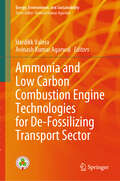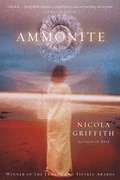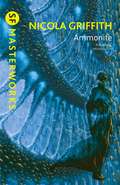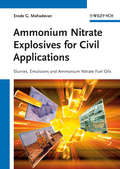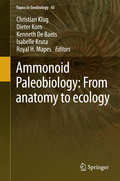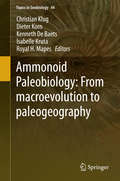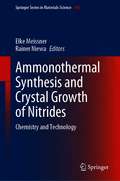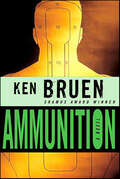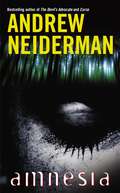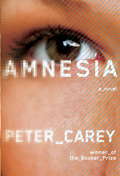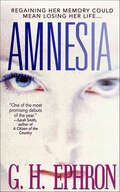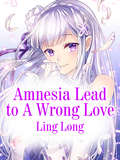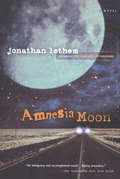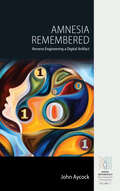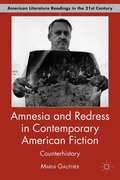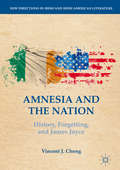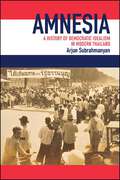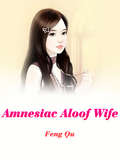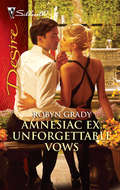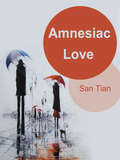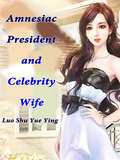- Table View
- List View
Ammonia and Hydrogen for Green Energy Transition (Energy, Environment, and Sustainability)
by Avinash K. Agarwal Sudarshan Kumar Bhupendra Khandelwal Paramvir SinghThe subject of this book pertains to the applicability of zero-carbon vector fuels, such as ammonia or hydrogen, in a practical scenario. This monograph extensively discusses the applicability or challenges associated with ammonia fuels for both IC-engine and gas turbine applications. It provides insights into ammonia cracking through catalytic membrane reactors for hydrogen production. This book also discusses NOx mitigation techniques for ammonia combustion, such as MILD combustion, two-stage combustion, porous assisted combustion, plasma combustion, and high-pressure combustion. This book also provides details on the chemical kinetics of ammonia and hydrogen combustion. The book can be a valuable reference for researchers and professionals interested in green energy and allied fields.
Ammonia and Low Carbon Combustion Engine Technologies for De-Fossilizing Transport Sector (Energy, Environment, and Sustainability)
by Avinash Kumar Agarwal Hardikk ValeraThis book explores the potential of ammonia (NH₃) as a next-generation fuel for achieving Net Zero emissions in the transport and power sectors. With increasing regulatory pressure to reduce carbon dioxide (CO₂) and carbon monoxide (CO) emissions, industries are seeking non-carbonaceous energy sources. Ammonia, with its carbon-free molecular structure, offers a promising alternative, but challenges such as high auto-ignition temperature, slow chemical kinetics, and combustion efficiency must be addressed. This book presents state-of-the-art research on ammonia-fueled internal combustion engines (ICEs), emission characteristics, and combustion enhancement techniques. It covers critical risk factors for ammonia-fueled marine diesel engines, safety considerations, pre-chamber ignition for lean combustion, and advanced optical techniques for soot characterization in fuel spray flames. By providing insights into cutting-edge developments, this book serves as a valuable resource for researchers, engineers, and industry professionals working toward sustainable and low-carbon combustion technologies.
Ammonite
by Nicola GriffithChange or die. These are the only options available on the planet Jeep. Centuries earlier, a deadly virus shattered the original colony, killing the men and forever altering the few surviving women. Now, generations after the colony has lost touch with the rest of humanity, a company arrives to exploit Jeep, and its forces find themselves fighting for their lives. Terrified of spreading the virus, the company abandons its employees, leaving them afraid and isolated from the natives. In the face of this crisis, anthropologist Marghe Taishan arrives to test a new vaccine. As she risks death to uncover the women's biological secret, she finds that she, too, is changing--and realizes that not only has she found a home on Jeep, but that she alone carries the seeds of its destruction. Ammonite is an unforgettable novel that questions the very meanings of gender and humanity. As readers share in Marghe's journey through an alien world, they too embark on a parallel journey of fascinating self-exploration.
Ammonite (S.F. MASTERWORKS)
by Nicola GriffithChange or die. These are the only options available on the planet Jeep. Centuries earlier, a deadly virus shattered the original colony, killing the men and forever altering the few surviving women. Now, generations after the colony has lost touch with the rest of humanity, a company arrives to exploit Jeep - and its forces find themselves fighting for their lives.Terrified of spreading the virus, the company abandons its employees, leaving them afraid and isolated from the natives. In the face of this crisis, anthropologist Marghe Taishan arrives to test a new vaccine. As she risks death to uncover the women's biological secret, she finds that she, too, is changing - and realizes that not only has she found a home on Jeep, but that she alone carries the seeds of its destruction ...Winner of the James Tiptree, Jr. Award 1993
Ammonium Nitrate Explosives for Civil Applications: Slurries, Emulsions and Ammonium Nitrate Fuel Oils
by Erode G. MahadevanThe book describes the science and technology of formulation and manufacturing of non-nitroglycerine explosives with ammonium nitrate as the main ingredient. Based on the author's industry experience of more than thirty years, it provides an unparalleled treatment of one of the commercially most important classes of explosives and therefore stimulates further research and development efforts in the field of explosives for civil applications.
Ammonoid Paleobiology: From Anatomy To Ecology (Topics in Geobiology #43)
by Christian Klug Dieter Korn Kenneth De Baets Isabelle Kruta Royal H. MapesThis two-volume work is a testament to the abiding interest and human fascination with ammonites. We offer a new model to explain the morphogenesis of septa and the shell, we explore their habitats by the content of stable isotopes in their shells, we discuss the origin and later evolution of this important clade, and we deliver hypotheses on its demise. The Ammonoidea produced a great number of species that can be used in biostratigraphy and possibly, this is the macrofossil group, which has been used the most for that purpose. Nevertheless, many aspects of their anatomy, mode of life, development or paleobiogeographic distribution are still poorly known. Themes treated are biostratigraphy, paleoecology, paleoenvironment, paleobiogeography, evolution, phylogeny, and ontogeny. Advances such as an explosion of new information about ammonites, new technologies such as isotopic analysis, tomography and virtual paleontology in general, as well as continuous discovery of new fossil finds have given us the opportunity to present a comprehensive and timely "state of the art" compilation. Moreover, it also points the way for future studies to further enhance our understanding of this endlessly fascinating group of organisms.
Ammonoid Paleobiology: From Macroevolution To Paleogeography (Topics in Geobiology #44)
by Christian Klug Dieter Korn Kenneth De Baets Isabelle Kruta Royal H. MapesThis two-volume work is a testament to the abiding interest and human fascination with ammonites. We offer a new model to explain the morphogenesis of septa and the shell, we explore their habitats by the content of stable isotopes in their shells, we discuss the origin and later evolution of this important clade, and we deliver hypotheses on its demise. The Ammonoidea produced a great number of species that can be used in biostratigraphy and possibly, this is the macrofossil group, which has been used the most for that purpose. Nevertheless, many aspects of their anatomy, mode of life, development or paleobiogeographic distribution are still poorly known. Themes treated are biostratigraphy, paleoecology, paleoenvironment, paleobiogeography, evolution, phylogeny, and ontogeny. Advances such as an explosion of new information about ammonites, new technologies such as isotopic analysis, tomography and virtual paleontology in general, as well as continuous discovery of new fossil finds have given us the opportunity to present a comprehensive and timely "state of the art" compilation. Moreover, it also points the way for future studies to further enhance our understanding of this endlessly fascinating group of organisms.
Ammonothermal Synthesis and Crystal Growth of Nitrides: Chemistry and Technology (Springer Series in Materials Science #304)
by Elke Meissner Rainer NiewaThis book provides a collection of contributed chapters, delivering a comprehensive overview of topics related to the synthesis and crystal growth of nitride compounds under supercritical ammonia conditions. Focusing on key chemical and technological aspects of ammonothermal synthesis and growth of functional nitride compounds, the book also describes many innovative techniques for in-situ observation and presents new data fundamental for materials synthesis under ammonothermal conditions. With its detailed coverage of many thermodynamic and kinetics aspects, which are necessary for understanding and controlling crystal growth, this contributed volume is the ideal companion to materials chemists and engineers at any point in their journey in this rich and exciting field.
Ammunition: A Novel (Inspector Brant Series)
by Ken BruenInspector Brant is back is back in Ammunition, the seventh novel in Ken Bruen's London-based cop series.Over the many years that Inspector Brant has been bringing his own patented brand of policing to the streets of southeast London, the brilliant but tough cop has made a few enemies. So when a crazed gunman, hired by persons unknown, pumps a magazine full of bullets into Brant in a local pub, leaving him in grasping at life (but ornery as ever), his colleagues on the squad are left wondering how to react.Brant's old partner Inspector Roberts, the man who may know him best, finds himself wondering why someone didn't shoot the hateful detective years ago. In Ken Bruen's Ammunition, they're all about to find out that the answer is quite simple: if you come after Brant you'd damn well better kill him the first time--because if you don't, you won't want to stick around to find out what happens next.
Amnesia
by Andrew NeidermanWhat would you do if you couldn't remember. . . who you were?where you lived?or what you might have done?Rush hour, Grand Central Station. Aaron Clifford stops dead in his tracks, commuters swirling around him -- but he doesn't know he's Aaron Clifford. He doesn't know who he is at all. No matter how hard he tries, he has no memory of why he is there, where he came from, or where he's going. It's impossible . . . maddening. . . but its true. The clues came slowly: from his surroundings, from his wallet, from the taste of dry martini still on his lips. Soon Aaron Clifford will piece together the keys to his life. With that relief will come cold-blooded fear -- as he learns more than he ever knew before. Things he shouldn't know. Things he doesn't want to know. Things that could get him killed. . . .
Amnesia
by Peter CareyFrom the two-time Booker Prize winner: a masterful, exceedingly timely new novel--at once dark, suspenseful and seriously funny--that takes us on a journey to the place where the cyber underworld of radicals and hackers collides with international power politics. When an internet virus throws open the gates at thousands of American prisons, the hacker turns out to be an unlikely young Australian woman. Has she declared cyber war on the United States or was her "Angel Worm" intended only to free the victims of Australia's immigration policies? Is she innocent? Can she be saved? The answers are up to journalist Felix Moore, a.k.a. Felix Moore-or-less-correct. His career is tanking when he gets this chance to write a biography that will vindicate the young woman. Funding is to be provided by an old friend--an outrageous millionaire property developer--and further impetus by an old flame: the young woman's actress mother whom Felix worshipped when they were at university together. And it will be our great good fortune to see the world through Felix's comic, cowardly, angry, yet fundamentally humane eyes as he attempts to save the young woman--and redeem himself in the bargain.
Amnesia
by Peter CareyThe two-time Booker Prize winner now gives us an exceedingly timely, exhilarating novel--at once dark, suspenseful, and seriously funny--that journeys to the place where the cyber underworld collides with international power politics. When Gaby Baillieux releases the Angel Worm into Australia's prison computer system, hundreds of asylum-seekers walk free. And because the Americans run the prisons (let's be honest: as they do in so many parts of her country) the doors of some five thousand jails in the United States also open. Is this a mistake, or a declaration of cyber war? And does it have anything to do with the largely forgotten Battle of Brisbane between American and Australian forces in 1942? Or with the CIA-influenced coup in Australia in 1975? Felix Moore, known to himself as "our sole remaining left-wing journalist," is determined to write Gaby's biography in order to find the answers--to save her, his own career, and, perhaps, his country. But how to get Gaby--on the run, scared, confused, and angry--to cooperate?Bringing together the world of hackers and radicals with the "special relationship" between the United States and Australia, and Australia and the CIA, Amnesia is a novel that speaks powerfully about the often hidden past--but most urgently about the more and more hidden present.From the Hardcover edition.
Amnesia
by Peter CareyThe two-time Booker Prize winner now gives us an exceedingly timely, exhilarating novel--at once dark, suspenseful, and seriously funny--that journeys to the place where the cyber underworld collides with international power politics. When Gaby Baillieux releases the Angel Worm into Australia's prison computer system, hundreds of asylum-seekers walk free. And because the Americans run the prisons (let's be honest: as they do in so many parts of her country) the doors of some five thousand jails in the United States also open. Is this a mistake, or a declaration of cyber war? And does it have anything to do with the largely forgotten Battle of Brisbane between American and Australian forces in 1942? Or with the CIA-influenced coup in Australia in 1975? Felix Moore, known to himself as "our sole remaining left-wing journalist," is determined to write Gaby's biography in order to find the answers--to save her, his own career, and, perhaps, his country. But how to get Gaby--on the run, scared, confused, and angry--to cooperate?Bringing together the world of hackers and radicals with the "special relationship" between the United States and Australia, and Australia and the CIA, Amnesia is a novel that speaks powerfully about the often hidden past--but most urgently about the more and more hidden present.From the Hardcover edition.
Amnesia (A Peter Zaks Mystery)
by G. H. EphronSylvia Jackson was shot in the head and left for dead in a cemetery in Boston, her boyfriend lying dead a few yards away. She's in a coma for six weeks, and when she wakes up, she can't remember anything--until three months later, when suddenly she begins to recall details of the crime and the killer. Finally, Sylvia accuses her ex-husband, remembering what seems like incontrovertible evidence of his guilt. Enter Dr. Peter Zak.
Amnesia (Peter Zak Mysteries #1)
by G. H. EphronIf the only witness to a murder has amnesia, how do you catch the killer? Instead of matching fingerprints or DNA, forensic psychologist Dr. Peter Zak solves cases by studying psychological clues and phenomena. Peter, whose specialty is the brain and behavior, consults for the Boston public defenders office, analyzing the thought processes and personalities of witnesses and defendants. Sylvia Jackson was shot in the head and left for dead, her boyfriend murdered. Waking from a coma after six weeks, she remembers nothing-until three months later, when she begins to recall details of the crime and the killer. Finally, Syl accuses her ex-husband, remembering what seems like incontrovertible evidence of his guilt. But Stuart Jackson seems destroyed by his ex's ordeal; could he really be guilty of this vicious crime? Peter quit consulting on trials a year ago when his wife was brutally murdered by a killer angered by Peter's suggestion of an insanity defense. But when his old colleagues call for help with this bizarre case, he's hooked. It's Peter's job to determine how reliable Syl's memory really is, and to use those memories to uncover the truth. Amnesia is guaranteed to be the start of an intriguing and original crime series.
Amnesia Lead to A Wrong Love: Volume 1 (Volume 1 #1)
by Ling LongA car accident, the one she loved the most, he had lost his memory. She only remembered the face of the person she liked …If someone else interfered, he would mistakenly believe that the person he liked had passed away! In order to make him fall in love with her again, she had wrongly believed that someone would change her character and stay by his side, but he could not remember who she was!Would she be able to recover her bereaved lover?Could they overcome the obstacles and come back together?"I will definitely make him remember again!"
Amnesia Moon
by Jonathan LethemIn Jonathan Lethem's wryly funny second novel, we meet a young man named Chaos, who's living in a movie theater in post-apocalyptic Wyoming, drinking alcohol, and eating food out of cans.It's an unusual and at times unbearable existence, but Chaos soon discovers that his post-nuclear reality may have no connection to the truth. So he takes to the road with a girl named Melinda in order to find answers. As the pair travels through the United States they find that, while each town has been affected differently by the mysterious source of the apocalypse, none of the people they meet can fill in their incomplete memories or answer their questions. Gradually, figures from Chaos's past, including some who appear only under the influence of intravenously administered drugs, make Chaos remember some of his forgotten life as a man named Moon.
Amnesia Remembered: Reverse Engineering a Digital Artifact (Digital Archaeology: Documenting the Anthropocene #2)
by John AycockOur modern culture is increasingly expressed in the form of digital artifacts, yet archaeology is in its infancy when it comes to researching and understanding them. The study and reverse engineering of digital artifacts is no longer the exclusive domain of computer scientists. Presented by way of analogy to the process of archaeological fieldwork familiar to readers, the 1986 Electronic Arts game Amnesia is used as a vehicle to explain the procedure and thought process required to reverse engineer a digital artifact. As a go-to reference to learn how to begin studying the digital, Amnesia is shown to be a multi-layered artifact with a complex backstory; through it, topics in data compression, copy protection, memory management, and programming languages are covered.
Amnesia and Redress in Contemporary American Fiction
by Marni GauthierThis book shows how a political and cultural dynamic of amnesia and truth telling shapes literary constructions of history. Gauthier focuses on the works ofDon DeLillo, Toni Morrison, Michelle Cliff, Bharati Mukherjee, and Julie Otsuka. "
Amnesia and the Nation: History, Forgetting, and James Joyce (New Directions in Irish and Irish American Literature)
by Vincent J. ChengThis book examines the relationships between memory, history, and national identity through an interdisciplinary analysis of James Joyce’s works—as well as of literary texts by Kundera, Ford, Fitzgerald, and Walker Percy. Drawing on thinkers such as Nietzsche, Marx, Freud, Luria, Anderson, and Yerushalmi, this study explores the burden of the past and the “nightmare of history” in Ireland and in the American South—from the Battle of the Boyne to the Good Friday Agreement, from the Civil War to the 2015 Mother Emanuel killings.
Amnesia: A History of Democratic Idealism in Modern Thailand
by Arjun SubrahmanyanThailand's monarchy and military have dominated the narrative of the country's modern history, and their leadership is often accepted as evidence of a cultural preference for authoritarianism. Despite a long history of military coups that have upended the course of the country's democracy, however, Thailand's democratic history is a vital though largely ignored aspect of modern Thai society. Based on extensive archival research, Amnesia delves into the social and political beginnings of Thai democracy and explains how a bloodless revolution against the monarchy in 1932 introduced a constitutional democracy and ignited enduring hopes for a fairer society and a more representative government. The "People's Party," a small group of commoners who staged the revolution in the name of democracy, found an enthusiastic audience for their bold populist rhetoric among wide swathes of society. In Amnesia, Arjun Subrahmanyan illustrates how the idealism of the first decade of Thai democracy, now largely forgotten, still shapes Thai society.
Amnesiac Aloof Wife: Volume 1 (Volume 1 #1)
by Feng QuShe purple xiao wei a woman with a unique appearance as if by heaven born in a good family chased by all men she is almost without a trace of trouble a disaster let her lose everything overnight an accident but also caused her to lose memory she had nothing but a face noble she fell from heaven to hell from princess to cinderella everything in life has been turned upside down the only thing that hasn t changed is the men who love her since the god gave up that is to create their own future shaking hands she decided to create her own life
Amnesiac Ex, Unforgettable Vows
by Robyn GradyThe last woman Samuel Bishop expected to have in his arms was his ex-wife. Left with amnesia from an accident, Laura had no memory of their bitter divorce. In her mind, she and the business tycoon were still newlyweds. With her ready to pick up where she thought their scorching-hot marriage had left off, he couldn't turn her down. But soon Bishop realized he was playing with fire. He wanted to reclaim the wedded blissthisLaura had shown him, but what would happen when her memory returned? And what would happen if it didn't?
Amnesiac Love: Volume 1 (Volume 1 #1)
by San TianHe is her dream lover in her most ignorant time appeared in her world brought her a new life new life but also he gave her the most painful pain in this life she would have given her life for him lost her memory to save him nearly lost her life for his child love is like a catastrophe trapped him she trapped her two people in the long river mutual support love but hurt each other separation is not eternal forever separation are painful declaration and lead them to meet again but is a long life in the life of a joke he and her children a child who is bound by flesh and blood becomes the hub of the two men s detente and whether they end up together or is this fate once again to play a joke on them who knows
Amnesiac President and Celebrity Wife: Volume 1 (Volume 1 #1)
by Luo ShuyueyingShe is not favored two miss su he is the powerful ming s cold president a glass of wine on the wedding she walked into the house in a daze he was forced to marry the woman he did not love she wanted him to remember but he wanted to get rid of her su jin laughs divorce we have no love he treated her coldly again and again her wounds black and blue his heart pricked when she gave up hope four years later with the little princess back he pursued soft language coax outside her fingers where should she and the baby go

